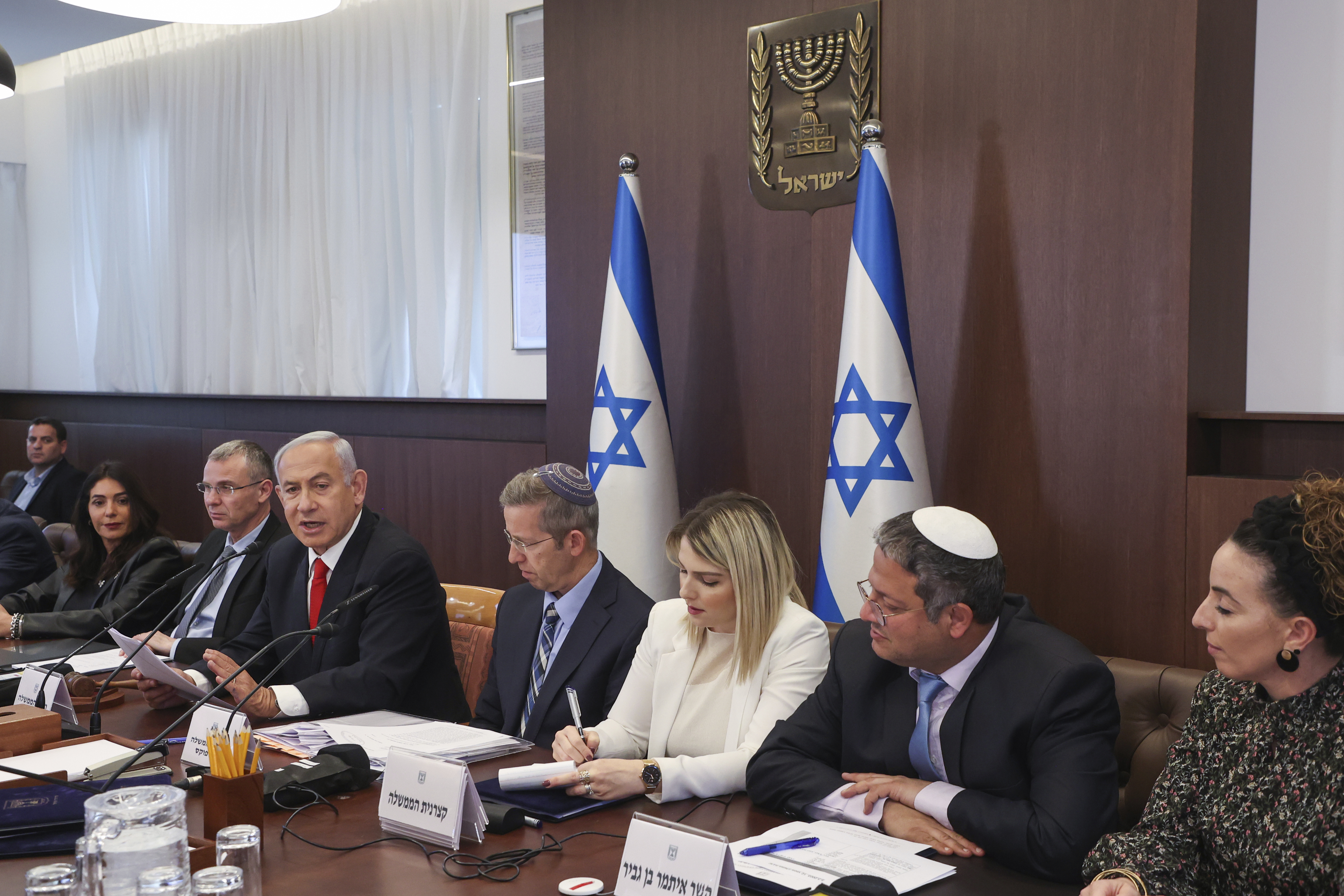
Israeli Prime Minister Benjamin Netanyahu’s plan to drastically limit the powers of Israel’s Supreme Court has sparked weeks of protests, rocked the country’s tech sector and raised fears of an outbreak of political violence.
Now protests appear even within the army.
Hundreds of reservists have either signed letters of reluctance to take on non-essential duties or have already opted out of training missions, officials said. Affected units include Department 8200, which focuses on signaling and cybersecurity and whose alumni have helped develop the country’s technology industry, as well as elite combat units.
According to senior military officials, the military leadership fears that the growing dissatisfaction of the military with the government’s plans will affect the operational readiness of the Israeli armed forces.
The unrest in the air force is an additional concern, officials say, as reserve pilots become increasingly frustrated with the government’s plans. They also fear they may be asked to take part in illegal operations and that restrictions on Israel’s judicial system could bolster calls from abroad to bring them to justice at the International Criminal Court, officials said. Reserve pilots often lead regular Israeli airstrikes in Syria and the Gaza Strip, and will also be involved in any major Israeli attack on nuclear facilities in Iran.

The military riots are the latest flare-up of opposition to the government’s plans to overhaul the justice system after protests brought hundreds of thousands of Israelis to the streets in cities like Tel Aviv. Prominent American Jews have also criticized the government’s plans, and on Sunday Michael Bloomberg, a former mayor of New York, wrote in a New York Times article that Netanyahu was “flirting with the disaster.”
For many Israelis, however, anger within the military is perhaps the most disturbing and serious reaction to the plans, which would increase government control over how judges are chosen, limit the Supreme Court’s ability to reject the new law, and make it easier for parliament to overturn it. judicial decisions.
About 50 brigade commanders, representing hundreds of reservist pilots, met with the Israeli Air Force commander on Friday to express their doubts about the judicial review effort, according to five Israeli military officials who either attended or were briefed about the meeting and who insisted on anonymity because they were not allowed to speak in public. The pilot corps is overwhelmingly made up of reservists who typically report to duty three to four times a month.
Thirty-seven pilots from the main F-15 fighter squadron later wrote to the Air Force Commander saying they would forego training for part of that week, while stressing that they remained combat-ready, according to three officials briefed on the matter. . , letter.
Many Israelis believe that the government’s plan to reform the judiciary will undermine democracy in the country. This view is shared by many army officers, some of whom took part in regular protests, although analysis of opinion polls taken during the November general election shows that the ruling coalition also received strong support from soldiers.
For the government’s supporters, the judicial changes it pushes through parliament are an important means of giving a majority of elected legislators an edge over unelected judges. However, critics say the revision would remove one of the few checks for arbitrary government in a country without a formal constitution that threatens the rights of Israel’s minorities.
Both sides accused the other of attempting a coup d’état, and a recent poll showed that more than a third of Israelis fear a civil war could break out over the crisis. Every week since the beginning of the year, Israelis have witnessed mass rallies against the government’s proposals, one of the biggest waves of protest in Israel’s history.
These tensions worries the military, which is seen as bringing together a divided society and remains an important security factor for a country embroiled in several low-profile conflicts, including with Iran.
Friday’s meeting between nearly 50 Air Force Reserve Corps officers and Air Force Command Lieutenant General Tomer Barr took place at Air Force Headquarters and was tense and tense, attendees say.
The reservists were concerned about judicial oversight itself, as well as fears that the government, led in part by far-right leaders, might order them to do something they deem illegal, several military officials said.

Last week, far-right finance minister Bazael Smotrich called on the state to “disappear” a Palestinian city caught in the middle of recent unrest in the occupied West Bank. According to the three officials, one of the participants in the meeting asked how a pilot could know for sure that, given the coordinates to bomb a specific target, it would not serve that purpose.
According to Roy Sodorf, the recently retired Deputy Attorney General for International Legal Affairs, because the revision would undermine the independence of the judiciary in Israel, it could strengthen the argument that the Israeli justice system is incapable of dealing with alleged crimes committed by Israelis.
In turn, that could increase pressure on prosecutors at the International Criminal Court in The Hague to indict Israeli officers, according to Sodorf, who has led efforts to protect Israeli officers from international prosecution.
Although no formal threats were made at the meeting itself to avoid standby duty, all but three of the 40 members of 69 Squadron, the main strike force that flies F-15 fighters, later wrote to Lieutenant General Barr that they will withdraw from training for part of this week, but remain ready for combat missions.
In a joint letter to Netanyahu and Defense Minister Yoav Gallad on Monday, all 10 living former Air Force chiefs expressed their “deep concern over the processes taking place in the State of Israel and in the Air Force.”
The letter said, among other things: “We fear the consequences of these processes and the serious and tangible threat that may arise for the State of Israel.”
The government largely dismissed the fears and warnings of the reservists as the wrath of a privileged elite fearful of losing their dominant role in society.
The indecisive reservists are “not patriots,” Information Minister Galit Distel Atbaryan said in a social media post Sunday evening. “This is not the salt of the earth. They are not Zionists. They are not our best children. They are not great people. They are not the people of Israel.”

On Monday evening, Netanyahu, who served as an officer in the commando unit, said in a speech that the actions of the reservists “threaten the very foundations of our existence.”
“There is room for protest, there is no room for conscientious objection,” the Israeli prime minister said along with far-right national security minister Itamar Ben-Gvir, who was barred from military service in the 1990s over concerns about his extremist views. views views
However, some members of the government were more conciliatory. “The situation requires negotiations and, indeed, in the near future,” the defense minister said.
There is also debate among the reservists themselves about whether military service should be politicized.
As reports circulated over the weekend of reservist dissatisfaction, Air Force Reserve Wing Commander Ori Seifert wrote an open letter to other reservists asking them to continue serving as pilots despite their opposition to judicial review.
“Like many of us, I am deeply concerned and wary of the course” of the administration,” Seifert wrote in a letter obtained by The New York Times. However, he added, “we must maintain the strength of the Air Force and the strength of the Israel Defense Forces.”
“To my reservist brothers, I say, protest and serve, serve and protest,” Seifert added.
The reservists, who had already decided to limit their volunteer service, said the decision was extremely difficult. A retired colonel in Unit 8200 — one of more than 500 cybersecurity reservists who signed a letter criticizing the judicial reform — said he was deeply concerned about the decision and would quickly return to duty if war breaks out.
“If we find ourselves in a situation where aggressive action is taken against Israel,” said the 47-year-old colonel, who declined to give his name for fear of security threats from Israel’s foreign enemies, “we will all be there to protect the citizens of Israel.”
Source: Kathimerini
Anna White is a journalist at 247 News Reel, where she writes on world news and current events. She is known for her insightful analysis and compelling storytelling. Anna’s articles have been widely read and shared, earning her a reputation as a talented and respected journalist. She delivers in-depth and accurate understanding of the world’s most pressing issues.